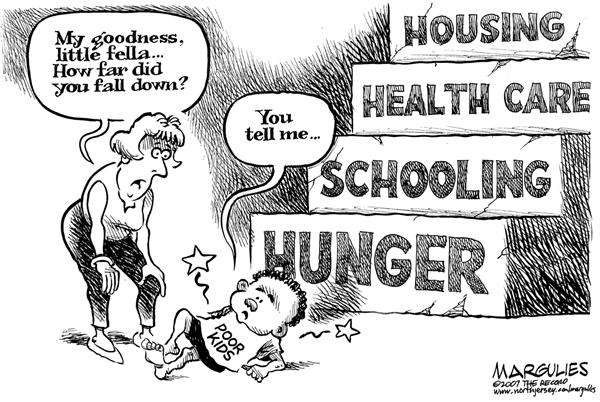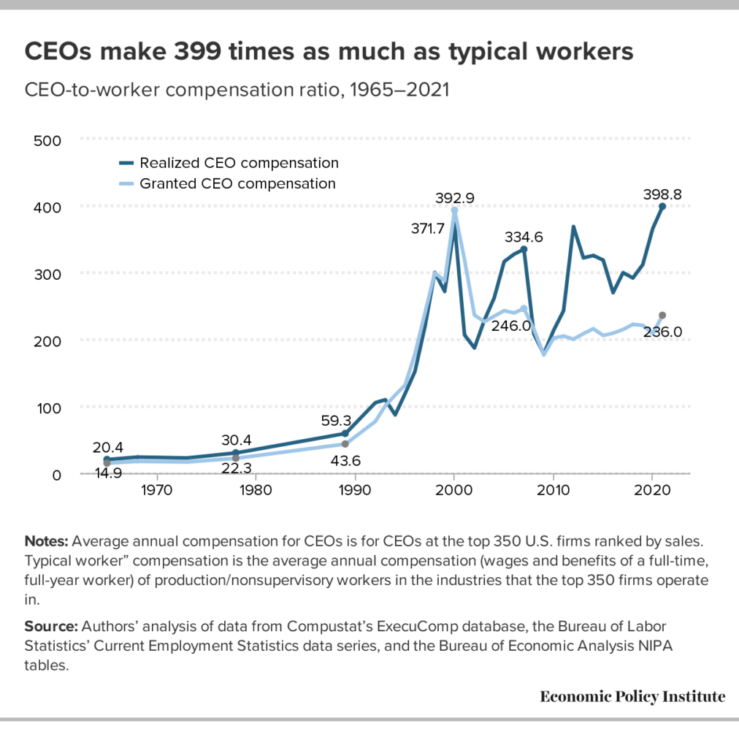Call Out Coercive Policies and Distorted Justifications
Since the rise of neoliberalism with Ronald Reagan, the United States policies for the provisions for any level of public education have been to squeeze it out of existence. In the neoliberal dogma, public education is an island of socialism in a sea of free financial action, see the New York Times article of November 15, 1981 for proof.

Since that time the possibility of federal support of spaces for very young children was eliminated, leading to the situation we have today: a moral and ethical disaster. The Department of Education no longer provides direct, line item federal funding for education like it did before 1981. Now all funds contain requirements which constrain local action, eliminate local, independent development of innovation, and silence calls for professional salaries for professional educators. When federal resources are bribes to state departments of early learning and settings for children to implement centralized controls and to purchase assessment products for corporate profits; the privileged continue to control the message.
Good people are bribed by Federal funding that requires acquiescence. Bribery is offering rewards for immoral or unethical acts. The first ethical principle is first do no harm. Under-resourcing the children born into poverty is causing harm. The second is to choose options that provide the greatest good for the most people. Direct support to young families, to programs for very young children, and to family wages and health care to the teachers and caregivers would provide the greatest good for the most people. Instead we have an authoritarian, centralized, coercive public policy, without recourse, without democracy, and without including the voices of the clients — the children and families. This widely accepted condition is both unethical and immoral.
Why?
I thought in my lifetime I would see gradual improvement in the provisions for early childhood, because it is so widely valued and so clearly a wise investment. We share a common joy of seeing children, grandchildren, and other people’s children happy and well provided-for, no matter what economic conditions they were born into. All children have an unalienable right to amiable spaces for them to grow into their most capable, compassionate and kind selves. Today, in the age of an existential emergency, we must bear witness to the failure to invest in human potential at the time it matters most: the first 1,800 days of a human life.

But no. We are not allowed to do that. Unjust constraints are applied to parent-supported early education under a contrived pretense of systems reform. Way back in 2000-2002, an effort called Smarter Reform prevented the equivalent idea of single-payer early education; like stopping Medicare for All ensuring profits to insurers, they seamlessly altered the distribution system for appropriations for education. No longer providing line-item funding for categories of support for competitive grants, the chose to fund implementations of a centralized agenda, entirely eliminating public input and ignoring local needs. Not a squeak from academia nor journalists.
Look at their obfuscating language. The government’s paid writer justifies sealing off democracy with opinions (beliefs), not facts, offers only two choices to consider, and graciously accepts the wisdom of both. This is what propaganda looks like. We have the appearance of building early education systems without actually funding what communities and families actually want for their children.

Smarter Reform: “We do not believe in a single ‘best’ funding stream or program model. Our view is that ECE can — and should — tap a wide range of funds from many sources and that the funds should flow to both programs (grants and contracts) as well as to families (via portable subsidy in the form of vouchers, certificates or tax benefits.) We do not see these two forms of financial assistance as mutually exclusive; in fact, we propose that they be combined, similar to how higher education, low-income housing, transportation, and other public goods in the U.S. are financed.” http://www.earlychildhoodfinance.org/about-the-alliance
Note systems, not openness, cooperation, or community action.
In the 1970’s we used to assume we were part of an evolving, altruistic effort to establish schools for our society in ways that were somewhat open to variability and local conditions. For example, the community/junior college movement in the United States was and still is an accessible, relatively inexpensive education opportunity after high school.
1980 the rich took control
Since Reagan, however, it has been starved of full time faculty, resources, and choice. Instead we have st standardized courses instead of creating and integrating interdisciplinary, problem-centered programs of study. We have turned to adjunct faculty who are poverty-stricken and increased levels of administration.
1980 Reagan Administration

A Slight move of the rudder the other way
What the government could have done in 1980 is support regional conferences to share expertise, just like doctors do. All Early Childhood Educators, especially faculty in higher education, could have been funded to meet annually or semi-annually, with transportation and lodging provided to a conference center nearby, to set their own agenda topics to meet community needs. Can you imagine being reimbursed travel and expenses to attend a regional gathering of your peers? Can you imagine the conversations and enthusiasm?
Can you imagine one step higher where region-level conferences for representatives from those regional conferences? An entirely different world would result.
The government has spent a lot more on control than it would have cost in fostering participation. Money is not the problem.
Can you imagine how sophisticated all community college courses would have been in 1990? By 2000 we would begin to transform those 1800 days for children in our country. By 2010 countries would visit us.
Without those neoliberal constraints we could have had democratic, cooperative schools and professionally paid educators for all young children. We also might have universal health care, a guaranteed minimum income, little poverty, and even fewer guns. All because we started with an investment in education for a democracy.
It’s not implementing a policy, it’s opening up the challenge to people to make life better. All children, not just the wealthy white ones, have a right to optimal, democratic early childhood opportunities.
Hidden Page for You
An example is Experiences Build Dispositions using a story from Teacher Tom’s Blog.
Invest in the Common Good
Many studies have shown that almost all the laws passed through Congress in the US benefit the wealthy, do not reflect what people in the republic actually want, demonize wise voices and beneficial traditions, and shrink the commons. We in the USA may not develop in my lifetime an investment in the commons comparable to Finland for young families and early education, but I am using what I have learned about professional ECE practice to open options within the system we have right now — one where silence and acquiescence have let the Gates Foundation, neo-liberal think-tanks, and insiders of both political parties normalize coercion simply because they can.